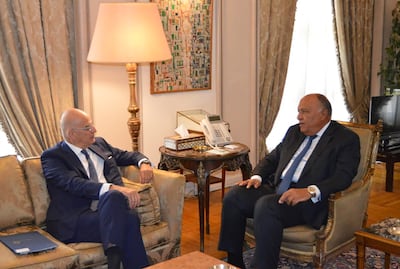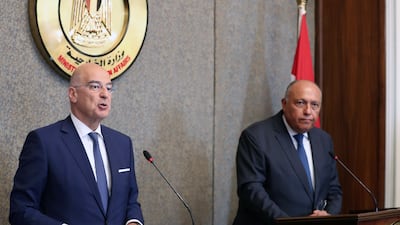Close allies Egypt and Greece on Sunday strongly condemned disputed maritime and gas deals between Turkey and Libya's Tripoli-based government, one of two rival administrations in the North African nation.
"Turkey seeks once again to take advantage of the turbulent situation in Libya in order to further destabilise the Mediterranean region and establish regional hegemony,” Greek Foreign Minister Nikos Dendias told reporters in Cairo after talks with his Egyptian counterpart, Sameh Shoukry.
“I was glad to see that all key stake holders as well as the European Union have publicly denounced those plans. No one can build new facts on the bases of illegal and illegitimate actions, no one can ignore geography, no one can create a virtual world," he said.
Cairo and Athens have in recent years strengthened ties, co-operating closely to develop energy resources in the eastern Mediterranean, sharing intelligence on terrorism and frequently conducting joint war games.
Egypt and Greece, along with Cyprus — another regional foe of Turkey — have signed maritime border agreements with the aim of facilitating the exploitation of large natural gas fields in the eastern Mediterranean.
Nato-member Turkey has for years been seeking to muscle in on efforts led by its three rivals and Israel to turn the region into an energy hub. Ankara has earned stern rebukes from the United States and the EU for engaging in illegal gas exploration in Cyprus’s exclusive economic zone.
Mr Dendias said his talks with Mr Shoukry focused on the memoranda of understanding signed last week between Turkey and Abdul Hamid Dbeibah, the leader of the Tripoli-based government.
The agreements include the joint exploration of hydrocarbon reserves in Libya’s offshore waters and on its territory.
Mr Dendias said the agreements were a threat to regional stability and infringed on Greek waters.
He noted that "the mandate of the Tripoli government has expired, and if I may say so, long ago. So it does not, I repeat it does not, represent the Libyan people".
The Egyptian foreign minister echoed his Greek counterpart's view, saying Mr Dbeibah's government had no authority to conclude such deals, given that its mandate expired following Libya's failure to hold nationwide elections in December.
He called on the UN to take a clear position on the legitimacy of the Dbeibah government, saying the international body should not stay silent.
Egypt and Turkey have been at odds since the Egyptian military in 2013 removed an Islamist president backed by Ankara amid mass protests against his divisive one-year rule.
The two regional heavyweights have held at least two rounds of exploratory talks to find ways to improve relations but made no tangible headway.
In contrast, Turkey and fellow Nato member Greece have been bitter rivals for two centuries. At present, they are at odds over territorial rights in the Aegean Sea, the rights of the small Turkish-speaking minority in Greece, and more recently their maritime borders in the Mediterranean.
Cyprus is also a major source of tension between the two neighbours.
Turkey, Greece’s former colonial master, invaded Cyprus in 1974 after the leaders of a coup there backed by the junta ruling in Athens at the time sought union with Greece. Turkey continues to occupy a third of the island, where Greeks have traditionally been the majority.
Other acts on the Jazz Garden bill
Sharrie Williams
The American singer is hugely respected in blues circles due to her passionate vocals and songwriting. Born and raised in Michigan, Williams began recording and touring as a teenage gospel singer. Her career took off with the blues band The Wiseguys. Such was the acclaim of their live shows that they toured throughout Europe and in Africa. As a solo artist, Williams has also collaborated with the likes of the late Dizzy Gillespie, Van Morrison and Mavis Staples.
Lin Rountree
An accomplished smooth jazz artist who blends his chilled approach with R‘n’B. Trained at the Duke Ellington School of the Arts in Washington, DC, Rountree formed his own band in 2004. He has also recorded with the likes of Kem, Dwele and Conya Doss. He comes to Dubai on the back of his new single Pass The Groove, from his forthcoming 2018 album Stronger Still, which may follow his five previous solo albums in cracking the top 10 of the US jazz charts.
Anita Williams
Dubai-based singer Anita Williams will open the night with a set of covers and swing, jazz and blues standards that made her an in-demand singer across the emirate. The Irish singer has been performing in Dubai since 2008 at venues such as MusicHall and Voda Bar. Her Jazz Garden appearance is career highlight as she will use the event to perform the original song Big Blue Eyes, the single from her debut solo album, due for release soon.
Price, base / as tested From Dh173,775 (base model)
Engine 2.0-litre 4cyl turbo, AWD
Power 249hp at 5,500rpm
Torque 365Nm at 1,300-4,500rpm
Gearbox Nine-speed auto
Fuel economy, combined 7.9L/100km
Can NRIs vote in the election?
Indians residing overseas cannot cast their ballot abroad
Non-resident Indians or NRIs can vote only by going to a polling booth in their home constituency
There are about 3.1 million NRIs living overseas
Indians have urged political parties to extend the right to vote to citizens residing overseas
A committee of the Election Commission of India approved of proxy voting for non-resident Indians
Proxy voting means that a person can authorise someone residing in the same polling booth area to cast a vote on his behalf.
This option is currently available for the armed forces, police and government officials posted outside India
A bill was passed in the lower house of India’s parliament or the Lok Sabha to extend proxy voting to non-resident Indians
However, this did not come before the upper house or Rajya Sabha and has lapsed
The issue of NRI voting draws a huge amount of interest in India and overseas
Over the past few months, Indians have received messages on mobile phones and on social media claiming that NRIs can cast their votes online
The Election Commission of India then clarified that NRIs could not vote online
The Election Commission lodged a complaint with the Delhi Police asking it to clamp down on the people spreading misinformation
Types of policy
Term life insurance: this is the cheapest and most-popular form of life cover. You pay a regular monthly premium for a pre-agreed period, typically anything between five and 25 years, or possibly longer. If you die within that time, the policy will pay a cash lump sum, which is typically tax-free even outside the UAE. If you die after the policy ends, you do not get anything in return. There is no cash-in value at any time. Once you stop paying premiums, cover stops.
Whole-of-life insurance: as its name suggests, this type of life cover is designed to run for the rest of your life. You pay regular monthly premiums and in return, get a guaranteed cash lump sum whenever you die. As a result, premiums are typically much higher than one term life insurance, although they do not usually increase with age. In some cases, you have to keep up premiums for as long as you live, although there may be a cut-off period, say, at age 80 but it can go as high as 95. There are penalties if you don’t last the course and you may get a lot less than you paid in.
Critical illness cover: this pays a cash lump sum if you suffer from a serious illness such as cancer, heart disease or stroke. Some policies cover as many as 50 different illnesses, although cancer triggers by far the most claims. The payout is designed to cover major financial responsibilities such as a mortgage or children’s education fees if you fall ill and are unable to work. It is cost effective to combine it with life insurance, with the policy paying out once if you either die or suffer a serious illness.
Income protection: this pays a replacement income if you fall ill and are unable to continue working. On the best policies, this will continue either until you recover, or reach retirement age. Unlike critical illness cover, policies will typically pay out for stress and musculoskeletal problems such as back trouble.




